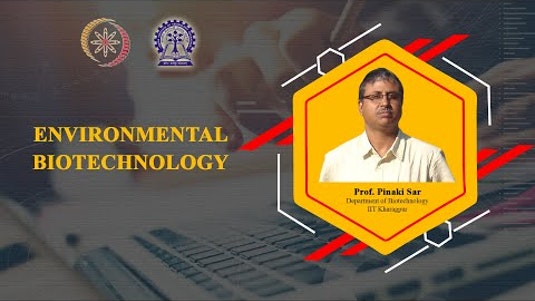Environmental Biotechnology free videos and free material uploaded by IIT Kharagpur Staff .
Week 1:Environmental Biotechnology and Sustainability. Scope and applications of the subject. Basics of ecosystem structure and function
Week 2:Microbial Ecology and Environmental Biotechnology: Concepts and importance of microbial ecology in Environmental Biotechnology
Week 3:Microbiology of Environmental Engineering System: Microbial diversity, growth and decay. Stoichiometry of microbial energetics and kinetics.
Week 4:Resource Exploitation by Microorganisms: Functions of various microbial groups relevant to environmental systems, including waste treatment and resource recovery, implications in biogeochemistry.
Week 5:Methods in Microbial Ecology with relevant to Environmental Biotechnology: Culture dependent and - independent analyses of microbial communities; PCR based methods, Microarray, Environmental genomics
Week 6:Microbial Principles of Biodegradation, Biodetoxification and other processes relevant for Environmental Applications: Microbial engines, (metabolism), Requirements for biodegradation, acclimation, Common biotransformation mechanisms; Effect of organic contaminant structure on biodegradability; Cooperation between different microbial species for enhanced biodegradation; Applying biodegradation kinetics to fate and transport modeling
Week 7:Bioremediation Technologies: Concepts, methods and applications of natural attenuation and engineered bioremediation (e.g bioaugmentation and biostimulation) Week 8:Microbial Interactions with Heavy Metals and Metalloids: Bioremediation, Biohydrometallurgy and other aspects of Environmental Biotechnology
Week 9:Aerobic and Anaerobic Degradation of Aliphatic and Aromatic Compounds. Microbial interaction with plastics, antibiotics and others emerging pollutants.
Week 10:Microbially Enhanced Phosphorus and Nitrogen Removal
Week 11:Microbially Enhanced Oil Recovery; Microbial role in Carbon Storage and Capture (sequestration, conversion to useful biopolymers, etc.).
Week 12:Case studies : Bioremediation, Carbon Storage and Capture, Bioenergy.
The Environmental Biotechnology course aims to introduce and elaborate the fundamental concepts and applications of biotechnology in all aspects of environment including its protection, restoration and sustainability. Considering the rising challenges of climate change, energy and environmental crisis, this course will emphasize upon the recent development of biotechnology for harnessing microbial potential in environmental applications. The course is structured to provide the students with fundamental concepts of environmental biotechnology, highlighting the importance of microbial ecology, their metabolism, methods for their characterization and scopes for implementation. Bioremediation and biodegradation principles, processes and applications will be discussed along with advanced applications in wastewater, oil recovery, biohydrometallurgy, biofuel, carbon storage and capture, etc. This course will offer the students a broad sense of understanding on how modern biotechnology is developed to achieve better environmental protection and sustainability through the use of microbes and microbial communities in pollution abatement to mitigation of climate change, bioenergy, biomaterial to enzyme discovery. .INTENDED AUDIENCE :B Sc. (Biosciences, Microbiology, Biotechnology, Botany, Any other branches of Life Sciences); M Sc. (Biotechnology / Life Sciences/ Environmental Sciences); B Tech (Biotechnology/Bioengineering)PRE-REQUISITE :Microbiology, Biochemistry, Genetics/Genomics SUPPORTED INDUSTRIES :Tata Consultancy Services, India; Tata Steel, India; ERM, India; ONGC, India; Aerobic Biotaxy India “Private” Limited, India Mining and Oil companies

- 0 Reviews
- 8 Students
- 351 Courses

Write a public review